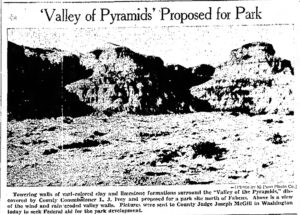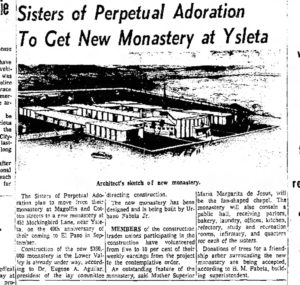El Paso County Commissioner Louis J. Ivey Make Surprising Discovery, 1935
In 1935, County Commissioner and pioneer lover valley cotton farmer discovered was named by “The Valley of The Pyramids”, 12 miles north of Fabens. It was described as ” a canyon filled with myriad colored clays shales and volcanic ash”. The El Paso Herald-Post wrote that it made Mckellington Canyon and Hueco Tanks looked like “two bits”. Ivey was searching for a new route for a new road to get to the mountains. and did receive funding for the road. The plan was to make this so-called “Valley of Pyramids, a scenic attraction of the southwest. The scenic attraction was 3000 acres. The El Paso Herald-Post also was described ” The Valley of Pyramids” as having perpendicular canyon walls that dropped into an area of color chalks clay similar to the deserts in Arizona”(May 8, 1935, El Paso Herald-Post page 1) Source: May 10, 1935, El Paso Herald-Post
The beginnings of the Mockingbird lane Perpetual Adoration Catholic Monastery, 1967
In 1967 Bishop Sidney Mezger dedicated the Corpus Christi Perpetual Adoration of the Most Blessed Sacrament Catholic Monastery on 451 mockingbird lane in the lower valley. It was built to housed nuns of the perpetual adoration, who then resided at The Shrine of Christ the King Monetary at the Perpetual Adoration Catholic Monastery on Magoffin and Cotton streets. The Monastery on Cotton and Magoffin streets was built in 1938. Land for the Mockingbird Lane Monastery was brought from E.C. Vickers and his wife. Mocking Bird Lane is in the Walkers Subdivision which goes back to 1928. The Walkers Addition was owned by Hugh Walker. Source: Feb 7, 1967, EPHP
-Joseph Longo


